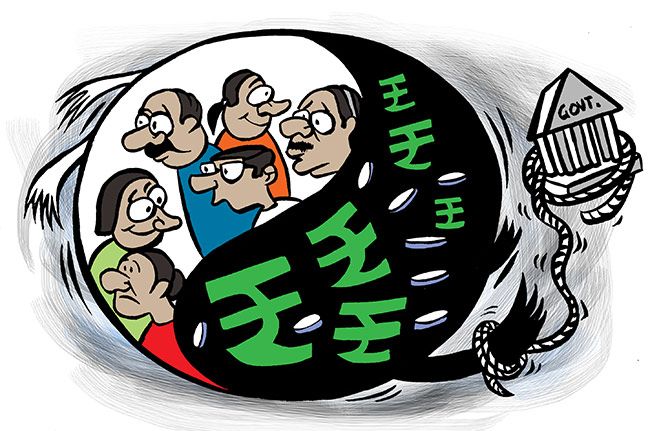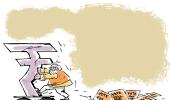'An era of fiscal pessimism is setting in, which, if not countered intellectually, is going to have the same effect as export pessimism has had,' notes T C A Srinivasa Raghavan.
Illustration: Uttam Ghosh/Rediff.com

Here's a question that India's economists need to answer: How is it that in an era of utter fiscal dominance, India has more monetary policy experts than fiscal policy ones?
Why has public finance been relegated to the backbench?
One answer, of course, is that monetary policy is more 'sexy'.
Another is that a really thorough analysis of public finances of the Indian Union, of the sort the finance commissions do, requires more work.
A third is that our US-trained economists follow the American intellectual fashion, which is obsessed with the bond markets.
These explanations are not mutually exclusive.
But their effect is the same -- a paucity of public finance experts, especially theorists.
The result is that our economists have no answer -- beyond the usual off-the-shelf ones -- to a question that has haunted all democratic countries after 1945: How will governments meet their ever-increasing expenditures?
I have trawled through a lot of what has been published on Indian public finances.
Amongst the star Indian economists, Partho Shome tried his hardest and best.
But in the end even he wasn't able to square the politics-economics circle.
His analysis is technically perfect but doesn't factor in either politics or politicians or voters.
It is like Wall Street without the bond market, or making sambhar without tamarind.
The National Institute of Public Finance and Policy does a lot of trends research.
But it yields little by way of new and practicable ideas and the analysis is mostly lacking in any theoretical background and often no more than a description of the tables.
The Reserve Bank of India also makes an attempt.
But it doesn't have an A-team for public finance.
Understandably, its focus is on the impact of fiscal policy on monetary policy.
The 14th Finance Commission did try to push the envelope a little.
But it was constrained by the orthodoxy of its staff.
So it stuck to the reduction of subsidies, salaries, pensions and interest payments format.
But howsoever desirable, this isn't going to happen.
Instead, we will see the opposite in the coming years.
Much of the rest of the meagre literature comprises mind-numbing analysis of revenue and expenditure trends.
It gets us no closer to a practical solution.
In sum, at least in my not-so-humble opinion, all the analyses establish just one thing: We simply have no idea what we are going to do in the next decade and more.
An era of fiscal pessimism is setting in, which, if not countered intellectually, is going to have the same effect as export pessimism has had.
We may simply end up letting the government forage for revenue as best as it can.
Fiscal policy serves voters while monetary policy serves the bond markets. The overlap is minuscule.
Monetary policy attempts to rein in governments so that the bond markets can bloom, at the cost of the voter.
Fiscal policy seeks to do the opposite, which is why, in spite of all the exhortations, a long-term bond market refuses to be born in India.
I believe that the game has been set up wrongly so that the emphasis is on the zero-sum, non-cooperative aspects of it.
Economists now need to devise a new, cooperative model in which the complementary aspects of Yin and Yang two are emphasised.
The first move in this direction has to be a purely intellectual one, in the way Keynes's was.
He proposed a specific solution to a specific problem, but dressed it in theory's plumage.
But it also contained the seeds of the current zero-sum problem.
That is why, after 1945, politicians the world over generalised it so easily.
But alas the clock cannot be turned back very easily now.
It is impossible to revert to a pre-1945, non-interventionist state.
The irony is that India had pretty much solved the problem as far back as 1955 when B K Nehru persuaded C D Deshmukh's RBI to give the government weekly overdrafts via the much-reviled ad hoc treasury bills.
This system worked perfectly well till Rajiv Gandhi misread L K Jha's prescription for higher budget deficits and made a massive fiscal mess, which led to the crisis of 1991, which led to the abolition of the ad hocs.
It was, in my view, a self-goal.
Now the time has come either to revive them in some limited way or to replace them with an equivalent.
The first step in this direction has to be a new theory.











